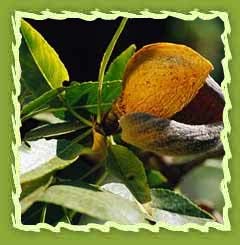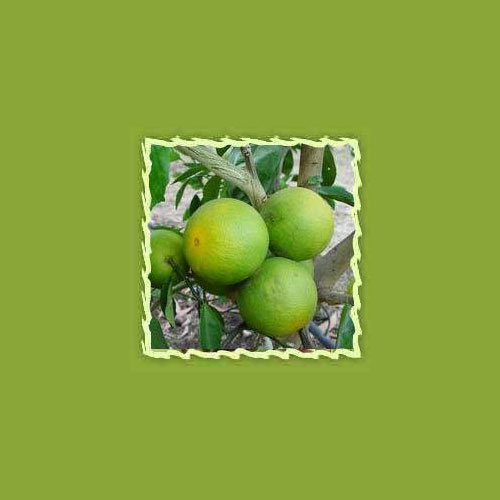Origin of Almond oil:
The wild form of almond grows in parts of mediterranean region. The tree is
a native of southwest Asia and is widely cultivated in Spain, Turkey,
Morocco, Tunisia and Egypt. Before cultivation and domestication occurred,
wild almonds were harvested as food and doubtless were processed by leaching
or roasting to remove their toxicity. Domesticated almonds appear in the
early bronze age(3000-2000 BC) of the Near East, or possibly a little
earlier. A well-known archaeological example of almond is the fruits found
in Tutankhamun's tomb in Egypt (c. 1325 BC), probably imported from the
Levant.

Description of Almond oil:
A middle sized tree upto 8 metre in height, leaves simple, flowers white
tinged with red, fruits velvety drupes about 3-6 cm long, separating into
two valves,on maturity exposing the compressed stones having minute holes.
The oil is sweet ,cooling antispasmodic and used in hepatopathy, cough,
ulcers etc.
Appearance : Mobile Liquid
Aroma : Sweet nutty aroma reminiscent of almond kernels,
cherry aroma.
Color : Golden
Chemical constituents: Almond oil has various chemical
compounds that include benzaldehyde, leucine, valine, phenylalanine, lysine,
arginine and hydrocyanic (prussic acid).
Extraction: It is extracted by the cold expression of
almond seed.
Aromatherapy uses:
The therapeutic properties includes laxative, diuretic, aphrodisiac,
demulcent, nutritious, aphrodisiac, lithontripic, emollient. It also helps
in strengthening and sense enhancing. Sweet almond oil is used as a
moisturizer and as a carrier oil in aromatherapy. It is an effective
emollient, softening and smoothing the skin. It is one of the most commonly
used carrier oils because it does not leave a greasy residue. It is obtained
from the dried kernel of the almond tree. The oil from the almond nut is
rich in vitamin A and a superb natural moisturiser. Almond Oil is very
beneficial for dry and mature skin, providing necessary moisture.
Cosmetics and Toiletries:
It provides minerals, vitamins and proteins that are essential for
beautiful skin. It penetrates skin easily and provides a protective barrier
against the elements. Almond oil is used extensively in making candles,
freshen potpourri, in soap making, massage oils, bath oil and also as a
perfume body oil. This oil is commonly used in skin care preparations for
it's moisturizing properties. It is useful for all skin types and is well
suited as a massage oil. The oil is used extensively in soapmaking.
Incence:
Almond oil is used in making special kind of incence called Auroshikha
Almond Incense which is made from essential oils of almond and ylang ylang.
The mild and sweet fragrance of the almond is a reason for its popularity.
It has the unique ability to neutralize strong offending odors and is often
used as a incence and room freshner.
Almond oil is used to create gem elixir. It can be made by
placing a gem stone in sweet almond oil so that the properties inherent in
the gemstone are imbued into the oil - blending with accentuating and
expanding the healing properties/vibrations of both the stone and the
essence oil.
Cultural aspect:
Almond oil is regarded as a symbol of watchfulness and promise due
to its early flowering, symbolizing God's sudden and rapid redemption of His
people among the Hebrews. In Bible, the almond is described as "among
the best of fruits".
Flavorings:
Almond is most often eaten on its own, raw or toasted, it is used in some
dishes. It is often sprinkled over desserts, particularly sundaes and other
ice cream based dishes. It is used in making a special kind of dish called
baklava and nougat. Almond is used in making butter and is preferred for its
less salty taste.
Almonds can be processed into a milk substitute simply called almond milk.
The nut's soft texture, mild flavour and light colouring (when skinned) make
for an efficient analog to dairy and a soy-free choice. Raw, blanched and
lightly toasted almonds all work well for different production techniques
and is relished well.
The almond itself contains practically no starch and may therefore
be made into flour for cakes and biscuits for patients suffering from
diabetes mellitus or any other form of glycosuria. Almond extract is also a
popular substitute for vanilla extract among people with diabetes.
Neroli Oil ( Citrus Auratium)
Origin of Neroli essential oil:The Neroli tree got its name from Neroli Italy, the Princess Anne Marie loved to have this oil, so it was named Neroli. The oil properties are extremely valued by the people of Venice who used it against plague and fevers.
Description of Neroli:Neroli essential oil is derived from the blossoms of either the sweet orange tree or the bitter orange tree. Our variety comes from the Bitter Orange tree which is viewed within the aromatherapy world as being of higher therapeutic quality.
Appearance Clear liquid
Aroma : : A powerful but delicate, sweet floral fragrance
Color : Coffee brown
Chemical constituents: Neroli oil has various chemical compounds that include methulacetophenone, carotenoids, monoterpenses, sesquiterpenes, alkaoids synerphrine, methyl, methyl tyramines, triterpenoids, ergosterol and stigmasterol.
Extraction: It is extracted by steam distillation of flowers.
Aromatherapy uses:Uplifting and easing the mind, restoring ones energy. It acts like a great nerve tonic, supreme skincare ingredient. It helps to relax if suffering from anxiety as it is a natural tranquilliser. The therapeutic properties are anti-depressant, antispasmodic, , anti-bacterial, anti-hypertension, bactericidal, cicatrizant, antiseptic, deodorant, fungicidal, emollient, cytophylactic, hypnotic, tonic, digestive-carminative, hepato-pancreatic, hypnotic and . For PMS or emotional tension - added drops of neroli oil to honey every night to relieve pain. A neroli essential oil bath is also beneficial for dry skin. This same remedy will help when one feel angered, exhausted or tense. For calming the mind - apply a drop of neroli oil to a tissue or use in depression, anxiety, nervousness & agitation. Neroli oil has been shown to improve mood.
Pharmaceutical Uses:Neroli is also used as an antidepressant which is good for the mind and thought. It work as an antiseptic which is used in minor inflammations and to kill germs and as an and also used in calming and relaxing. It is known to regenerate skin cells and improves the skin elasticity. It is also good for preventing acne, scarring and stretch marks. It is used to relieve depression, stress, shock and panic. It is popular for weddings, its white blossoms are used in bridal bouquets, symbolizing purity and it also helps calm the bride's nerves with sweet and floral smell.
Perfumery:Neroli oil is used to flavor pharmaceuticals and the absolute is used extensively in high-cost perfumery work, especially Oriental, floral and citrus blends, also as a fixative. The oil is used in eau-de-cologne and toilet waters (traditionally with lavender, lemon, rosemary and bergamot). Limited uses as flavoring ingredient in foods, alcoholic and soft drinks. It is used to scent candles; freshen potpourri; in soap making; massage oils; bath oil and as a perfume body oil.
Cosmetics and Toiletries:The distillation water, known as orange flower water, is a popular cosmetic and household article. Bath- For bath add a total of 10 to 15 drops of neroli oil to an already full bath. Agitate the water to thoroughly disperse the oils before getting in.
Compress- Add 5 to 8 drops of neroli oil to 2 cups hot or cold water and agitate to disperse oils. Briefly soak a cotton cloth, wring and place on skin. Repeat every 15 minutes for up to one hour.
Inhalation Place 1 to 3 drops of neroli oil on a cloth to inhale or place 1 to 3 drops of essential oil into a bowl of hot water, cover head and bowl with a towel and inhale for relaxation.

